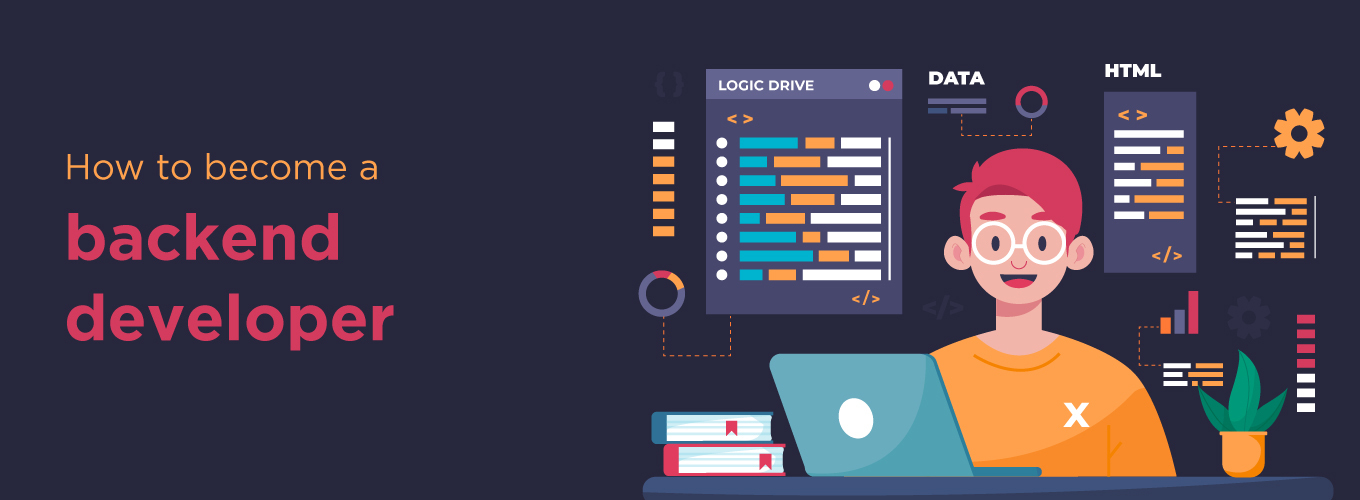How to become a backend developer?
The demand for Backend Developers keeps growing across sectors and industries. However, there is a shortage of skilled Backend developers across the world. Talent skilled in Backend technologies are hence incredibly high in demand.
Table of Contents
Backend developers build code that allows a database and an application to communicate with each other. Backend developers take care and maintain the parts of the website that you cannot see including databases, servers, and apps.
What does a backend developer do?
The job of the backend developer involves focusing on website architecture, scripting, and writing code that communicates between the website’s database and the user’s browser. A backend developer often designs systems that support a website and are responsible for creating the infrastructure on which a website runs. They often use programming languages like Python, Java, Ruby, or PHP. Once a website is online, you will need to implement and manage a database of information for the website, troubleshoot performance issues, optimize the site’s performance, and analyze data from the website.
Key skills required for a backend developer
Backend developers need a variety of skills. Some of them are technical and others not technical.
- Knowledge of at least one web development language
- Organizational skills
- A good understanding of database and cache technology
- Time management skills
- Knowing how to manage hosting environments
- Good understanding of accessibility and security issues
- Effective communication skills
- Understanding of framework utilization
- Awareness of the importance of the backend role in the overall development.
- Good coordination capability with the frontend developers to enable better user experience
- Knowledge of APIs, including how to create and implement them
- Being detail oriented
Steps to becoming a backend developer are many and we have outlined a few of these below.
1.Education
Although there is no specific degree to be obtained, most companies prefer hiring someone with a Bachelor’s degree in computer science. If you do not have a Bachelor’s degree, it may still technically be possible for you to work as a backend developer if you have some certifications and have attended a programming bootcamp. You need to have the basic skills required to get started in your career, which includes knowing a programming language and the fundamental concepts of programming. Since web development is a growing field, skilling yourself will be important especially if you want to set yourself apart from other candidates.
2.Learn at least one backend programming language
Every backend developer must know at least one programming language to begin with either Python, Java, PHP, or Ruby. You could start with one but learning all these will greatly help and support your career as a backend developer. Start with learning one that looks interesting and accessible to you and then you will slowly pick up the others as well. It will be very helpful in your career if you learn all these programming languages since these languages make up the code on the server that runs your website.
Also Read: How To Become A Machine Learning Engineer
3.Understand hosting
It will be important to understand the various website hosting options since you may be working on a project from the start or be a startup developer. There are two primary options in hosting: managed hosting servers and cloud hosting providers. The first option is a user-friendly interface and is more for those who are not very technologically savvy. The second is for people with good development skills.
4.Learn about databases
Most websites rely on a database of some sort. It could be managing information from website users or allowing users to access certain information. Databases are important for developers because the server might need to store information to function.
5.Learn about frameworks
Most frameworks are based on a programming language and allow the user to create templates and other reusable code which can save time over programming the whole website. If you have a knowledge of frameworks related to the programming languages you know, it will show potential employers that you are aware of how to streamline the development process.
6. Gain experience as a backend developer
Before securing a job as a backend developer, it would be of great help if you could gain experience working on backend projects. You could work for a smaller company or a volunteering organization. You could also try and work on your own projects like creating your own daily scheduler for instance. Ensure that you get some experience before you apply for your first job.
Also Read: How To Become A Cloud Engineer
Summary
When you get into applying to companies, potential employers would like to see some samples of work in your resume. Ensure that your resume highlights your best attributes related to backend programming. Ideally it would be good to create a portfolio of your backend projects. Find a way to host these projects together such as having one website that links them all. This will be a great showcase of your capability in backend programming which is often difficult to communicate in a resume or during an interview.
People also ask
- What education and certifications are required to become a backend developer?
While formal education and certifications are not always mandatory to become a backend developer, having a relevant degree in computer science, software engineering, or a related field can be beneficial. Additionally, certifications such as Oracle Certified Professional Java SE Programmer, AWS Certified Developer, or Microsoft Certified: Azure Developer Associate can demonstrate your expertise and boost your resume.
- What resources are available to learn backend development?
There are plenty of online resources available to learn backend development, including:
- Online tutorials and documentation: Websites like MDN Web Docs, Stack Overflow, and GitHub provide tutorials, documentation, and code examples for backend technologies.
- Online courses: Platforms like Udacity, Coursera, and Pluralsight offer online courses specifically focused on backend development.
- Books: There are many books available on backend development topics, covering different programming languages, databases, and frameworks.
- Coding bootcamps: Coding bootcamps like Le Wagon, General Assembly, and Flatiron School offer intensive, short-term programs that focus on backend development skills.
- Open-source projects: Contributing to open-source projects can provide hands-on experience and help you learn from experienced developers.
- How can I gain practical experience in backend development?
Gaining practical experience in backend development can be achieved through:
- Building personal projects: Create your own backend projects, such as web applications, APIs, or databases, to apply the concepts you have learned and gain hands-on experience.
- Internships or freelance work: Look for internships or freelance opportunities to work on real-world backend projects, which can provide practical experience and add to your portfolio.
- Contributing to open-source projects: Contribute to open-source projects to gain practical experience, collaborate with other developers, and learn from their feedback.
- Hackathons or coding challenges: Participate in hackathons or coding challenges that focus on backend development to solve real-world problems and improve your skills.
- How to stay updated?
As a backend developer, staying updated with the latest updates and trends in the industry is crucial to keep your skills relevant and up-to-date. Here are some ways to stay updated:
- Follow industry news and blogs: Stay up-to-date with the latest news, trends, and updates in the backend development field by following industry news websites, blogs, and forums. Websites like Hacker News, Stack Overflow, and Medium have relevant articles and discussions on backend development topics.
- Follow thought leaders and influencers: Follow influential backend developers, industry experts, and influencers on social media platforms like Twitter, LinkedIn, and GitHub. They often share valuable insights, updates, and resources related to backend development.
- Attend conferences and meetups: Attend backend development conferences, meetups, and workshops in your area or online. These events provide opportunities to learn from industry experts, network with other developers, and stay updated with the latest developments.
- Take online courses and tutorials: Enroll in online courses and tutorials offered by reputable platforms like Udacity, Coursera, and Pluralsight. These courses often cover the latest technologies, tools, and best practices in backend development.
- Read technical documentation: Stay updated with the latest technical documentation of the backend technologies, frameworks, and libraries you use or are interested in. Official documentation often provides the most up-to-date information and best practices.
- Participate in online communities: Join online communities and forums dedicated to backend development, such as GitHub, Stack Overflow, and Reddit. Engage in discussions, ask questions, and share knowledge with other developers to stay updated with the latest trends and updates.
- Experiment with new technologies: Stay curious and experiment with new backend technologies, frameworks, and tools. Try out new libraries, frameworks, and techniques in your personal projects to stay updated with the latest advancements in the field.
Continuously learn and improve: Backend development is a constantly evolving field, and it’s important to have a growth mindset and continuously learn and improve your skills. Keep yourself updated with the latest resources, tools, and techniques through self-directed learning, online courses, and certifications.









